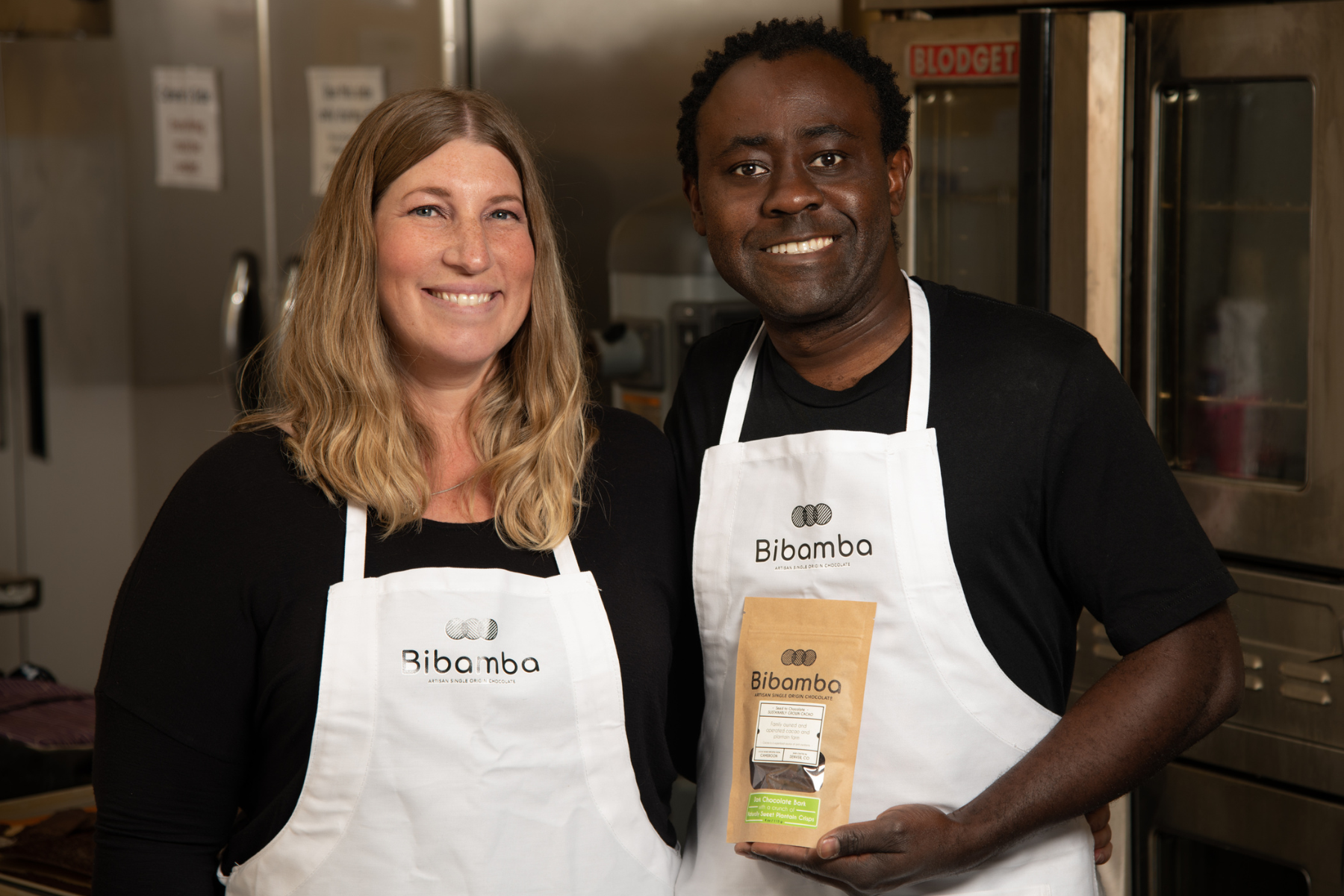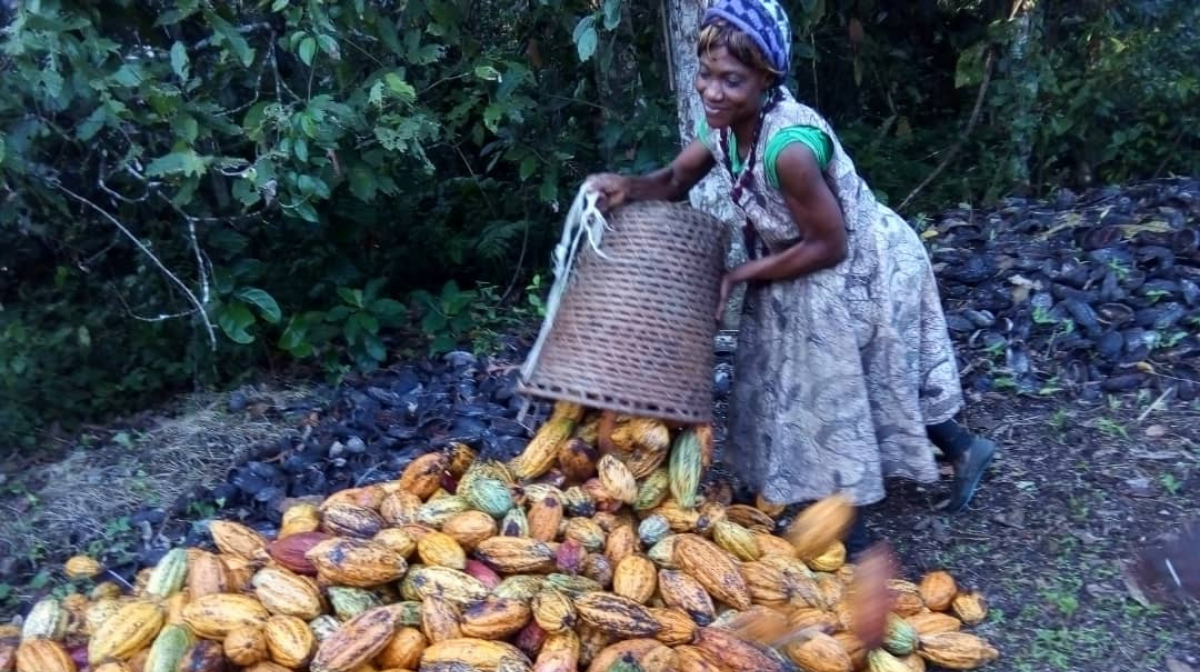
Bibamba

Audio By Carbonatix
Patrick and Mara Tcheunou are living the sweet life in Denver.
A native of Cameroon, Patrick’s urban upbringing was coupled with summer visits to his grandparents’ land in the countryside, where cacao, coffee and other crops were grown both commercially and for the family’s table.
Despite these rural roots, Patrick initially chose a different career path. He learned to speak English in his late twenties, then immigrated to the United States to complete a master’s degree as a chemical engineer. But today, he’s a Denver-based chocolatier working alongside his wife and business partner, Mara. With a shared entrepreneurial spirit, they launched Bibamba Artisan Chocolate in August 2020.
The couple’s business venture really began five years earlier, when they purchased a 56-acre plot in Cameroon with the intention of cultivating cacao. As with wine, the unique terroir of a region highly influences the flavor and quality of chocolate. With agricultural data and the support of Patrick’s brother, who had boots on the ground, they selected land for this project in Nkoteng, a small town in the African country’s Centre Region.
Their desire to grow cacao was inspired by reports of an impending shortage – which has, indeed, come to pass. “Looking at the shelves, consumers will notice prices going up, or less actual cocoa in chocolate products. This is what was predicted ten years ago, and it’s really hitting the industry now,” says Mara.
The Tcheunous’s first cacao harvest was shipped in the midst of the pandemic, leading them to pivot from a wholesale focus into retail. “I think we positioned ourselves in a good way, having our direct sourcing,” she adds.
The current cocoa deficit is largely attributed to aging and less productive trees, plant diseases and adverse weather conditions, particularly in Western African countries. According to the Food Empowerment Project, this region supplies roughly 70 percent of the world’s cocoa, which few consumers realize. Patrick says: “People struggle to recognize the impact [and] the contributions of Africans to humanity and to this country.”

Cacao beans harvested at the Tcheunous’ farm in Cameroon.
Bibamba
But unfortunately, chocolate production is often far more bitter than sweet. The industry has long had a direct connection with child labor, human trafficking and slavery. These issues persist in 2025, despite verified documentation and widespread awareness of the issue. Approximately 2.1 million children work on cocoa farms in Côte d’Ivoire and Ghana alone; child labor has also been reported in Guinea, Nigeria and Sierra Leone, as well as Cameroon.
Many consumers have no idea of this, however. Mara admits that her knowledge of the unsavory situation really came after she began researching cocoa production and distribution on a large scale. “There’s a lot of information out there if you look for it,” she affirms. “Even some mainstream companies that might make claims not to participate in that are not tracking where their cacao is coming from.”
Today, Bibamba provides consumers with a socially and environmentally ethical option – and its locally made chocolate treats also happen to be delicious.
To check all the right boxes without costly certifications, such as a Fairtrade mark or USDA organic label, the Tcheunous’s farm in Cameroon hires fourteen to fifty community members, with more on staff during the harvest season.
From cultivating trees and hand-cutting cacao pods to fermenting and drying the beans, “There’s a lot of labor involved,” Mara says of cocoa production. “We want to only support people who choose to be in the industry and make sure they’re taken care of. Our employees receive more than a fair living wage and health coverage.”
Workers in Cameroon feed their families the companion plants growing on the farm, such as mangos, papayas, avocados and peppers. “There’s a lot of biodiversity. Other crops add nutrients to the soil and contribute to the flavor profile of the cacao,” she explains. This sustainable method of agriculture has also resulted in what Mara describes as a “wild increase” in cocoa production.
From bean to bar, Bibamba is committed to transparency. Its shop in the Edgewater Public Market, which debuted in January 2024 and ranks among the best Denver dessert shops, offers a glimpse into its kitchen. When they shifted to a retail model, the Tcheunous developed their craft through workshops with local chocolate artisans. “We learned the whole process, from roasting and winnowing the cacao beans to grinding it up and making chocolate,” Mara explains. Now, the company makes more than twenty products, including dark, milk and white chocolate barks, as well as confections like handmade bonbons and trendy Dubai chocolate bars.

Bibamba will host truffle-making classes on Juneteenth.
Bibamba
Truffle-making classes offer a more in-depth look into Bibamba’s processes. Visuals are shared and sensory items such as cracked-open cacao beans passed around, highlighting the work accomplished on the company’s Cameroonian farm. Participants also have the opportunity to taste chocolate in various stages of production, watch a demonstration on how to craft ganache, and select their own flavor combinations for the box of truffles that they take home. Some draw inspiration from Bibamba’s signature selection featuring dark chocolate with strawberry and pistachio fillings, plus pieces reminiscent of lemon cheesecake and hot cocoa with marshmallows.
Bibamba also offers classes, priced at $65 per person and limited to sixteen guests; one is set for 6 p.m. on June 19, which is Juneteenth. Bibamba’s owners made a conscious choice to set a class on this day commemorating the end of slavery in the United States.
Mara notes that these classes offer an opportunity to educate consumers about the industry’s ongoing tragic reality – to help them make more informed purchasing decisions when buying chocolate. In addition to lowest-tier pricing, the absence of certifications on a package can be a red flag, she warns: “If it does not say where something comes from or who made it, maybe that’s something for [consumers] to be curious about.”
In contrast, Bibamba’s product packaging proudly includes lines like “sustainability grown on our family-owned farm” and “cacao beans from Cameroon; handcrafted in Denver.” It also features an official emblem from Slave Free Chocolate, which Mara recommends as a reliable resource. That grassroots organization offers a list of chocolatiers that are not in partnership with any “complicit” companies. Bibamba appears in its guide, as well as one published by the Food Empowerment Project.
“I am a big advocate for person-to-person connections, and we want to support that in every way that we can,” says Mara. “One of our taglines is, ‘Chocolate that works for everybody.’ We really do want [Bibamba] to be a successful enterprise that serves our employees and their families in Cameroon, as well as our U.S. employees and customers.”
Sweet!
Bibamba Artisan Chocolate is located at 5505 West 20th Avenue, Edgewater, and is open from 11 a.m. to 7 p.m. daily. For more information, visit its website at bibamba.com.